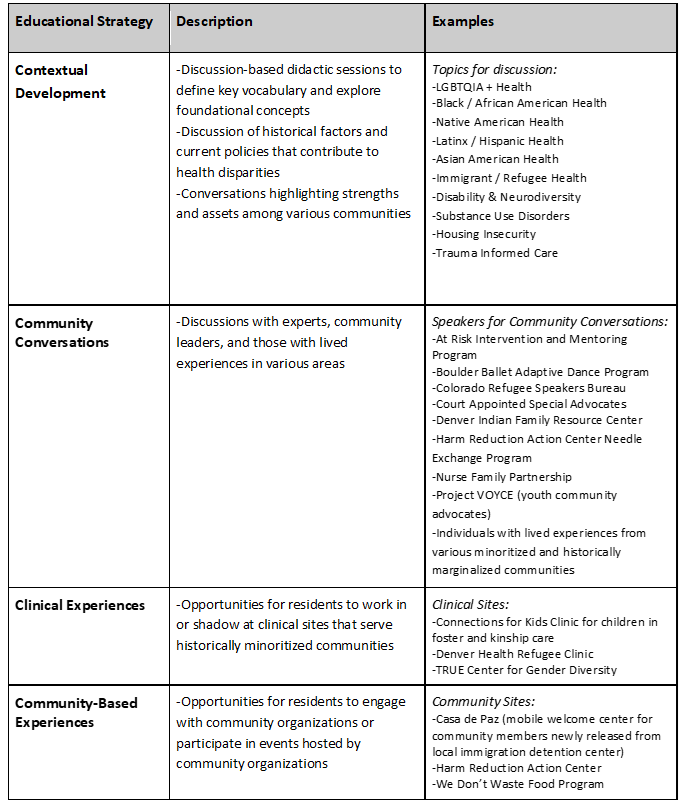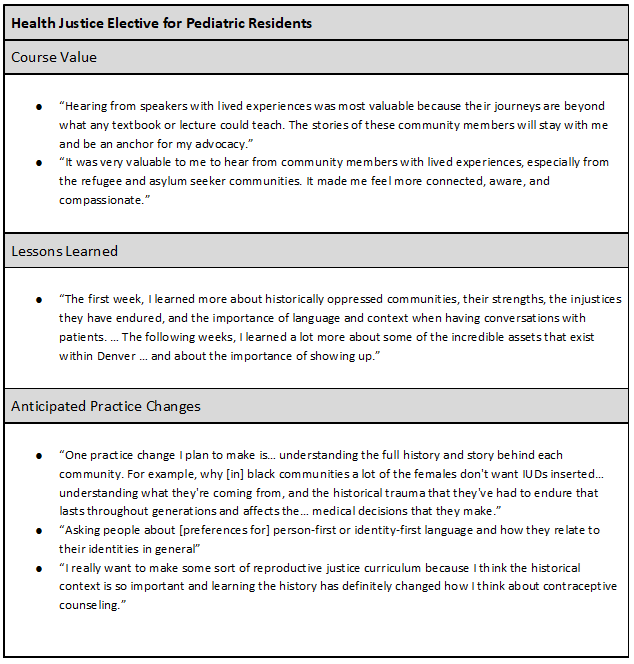Back
Background: Critical assessment of historical and current policies and systems is essential to understanding health disparities. Addressing disparities requires partnerships between community, government, and health systems. Traditional health disparities curricula focus on variation in outcomes across groups without centering the lived experiences of individuals through community-based learning. Health Justice is a novel framework for using the expertise of community members to explore how health systems can intentionally redistribute economic, political, and cultural assets to oppressed groups in order to eliminate disparities.
Objective: To collaborate with community members and organizations to implement and evaluate a Health Justice Elective for pediatric residents that equips trainees to address historic injustices and social conditions leading to health disparities
Design/Methods: This curriculum was designed using Kern’s framework and a Connectivist Learning Model. The Health Justice rotation was a 4-week resident-led elective. Learning goals included: 1) Define health justice, 2) List events that contribute to inequities, 3) Gain clinical experience working with diverse patients, 4) Build relationships with community members, and 5) Identify how providers and systems can contribute to Health Justice. The curriculum included four core components- contextual development, community conversations, clinical experiences, and community-engagement experiences (Table 1). Achievement of learning goals was assessed through resident focus groups and surveys.
Results: 14 residents and over 25 community partners participated in the elective. Thematic analyses found that participants defined a justice-oriented physician as one who practices cultural humility, centers voices of the community, is active in community initiatives, and views Health Justice as essential to practicing medicine. Community members expressed appreciation for involvement in medical education, interest in future participation, and desire for continued partnership. Residents' responses related to the value of the course, lessons learned, and anticipated practice changes are listed in Table 2.
Conclusion(s): The Health Justice rotation provided trainees with an understanding of Health Justice as a framework for addressing health disparities. They gained knowledge of factors underlying health disparities, deepened connections with community members and peers, and gained experience working with diverse patients. Residents considered it highly valuable and community members appreciated the opportunity to share their knowledge.


Medical Education: Diversity, Equity & Inclusion
Medical Education 4: Diversity, Equity, & Inclusion 1
502 - Development, Implementation, and Impact of a Health Justice Elective for Pediatric Residents
Friday, April 28, 2023
5:15 PM – 7:15 PM ET
Poster Number: 502
Publication Number: 502.125
Publication Number: 502.125
John M. Guerrieri, University of Colorado School of Medicine, Denver, CO, United States; Kathryn Kalata, University of Colorado School of Medicine, Denver, CO, United States; Alexis Ball, Seattle Children's, North Bend, WA, United States

John M. Guerrieri, MD (he/him/his)
Doctor
University of Colorado School of Medicine
University of Colorado
Denver, Colorado, United States
Presenting Author(s)
Background: Critical assessment of historical and current policies and systems is essential to understanding health disparities. Addressing disparities requires partnerships between community, government, and health systems. Traditional health disparities curricula focus on variation in outcomes across groups without centering the lived experiences of individuals through community-based learning. Health Justice is a novel framework for using the expertise of community members to explore how health systems can intentionally redistribute economic, political, and cultural assets to oppressed groups in order to eliminate disparities.
Objective: To collaborate with community members and organizations to implement and evaluate a Health Justice Elective for pediatric residents that equips trainees to address historic injustices and social conditions leading to health disparities
Design/Methods: This curriculum was designed using Kern’s framework and a Connectivist Learning Model. The Health Justice rotation was a 4-week resident-led elective. Learning goals included: 1) Define health justice, 2) List events that contribute to inequities, 3) Gain clinical experience working with diverse patients, 4) Build relationships with community members, and 5) Identify how providers and systems can contribute to Health Justice. The curriculum included four core components- contextual development, community conversations, clinical experiences, and community-engagement experiences (Table 1). Achievement of learning goals was assessed through resident focus groups and surveys.
Results: 14 residents and over 25 community partners participated in the elective. Thematic analyses found that participants defined a justice-oriented physician as one who practices cultural humility, centers voices of the community, is active in community initiatives, and views Health Justice as essential to practicing medicine. Community members expressed appreciation for involvement in medical education, interest in future participation, and desire for continued partnership. Residents' responses related to the value of the course, lessons learned, and anticipated practice changes are listed in Table 2.
Conclusion(s): The Health Justice rotation provided trainees with an understanding of Health Justice as a framework for addressing health disparities. They gained knowledge of factors underlying health disparities, deepened connections with community members and peers, and gained experience working with diverse patients. Residents considered it highly valuable and community members appreciated the opportunity to share their knowledge.


